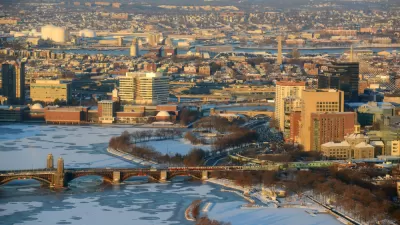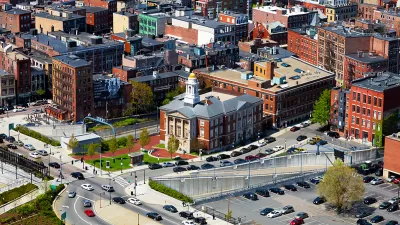At a forum held this week, Boston mayoral candidates demonstrated their fluency in the language of transportation alternatives and livable communities. But ideas for meaningful policy changes were largely missing, says Boston Streets.
As Mayor Thomas Menino winds down his fifth term in office, a burgeoning bike culture and 40 percent car-free population signify a city moving away from reliance on the automobile. And after 20 years under the same administration, the situation is ripe for a candidate willing to push for a truly multimodal future.
With that opportunity evident, "[e]ight of the twelve candidates for Boston mayor gathered tonight at the Public Library for a forum on Transportation and Livable Communities," reports Boston Streets blog. "Each tripped over himself to proclaim his support for cycle tracks and protected bicycle facilities. The boisterous crowd cheered as candidates named their favorite neighborhoods and identified top transportation priorities, from changing our auto-oriented culture to embarking on comprehensive planning for the city."
But when it came time to address opportunities for congestion pricing and reforming the city's parking requirements, resolute advocacy was hard to find.
"Still, while any of these candidates would likely continue to push Boston in the right direction, none seemed willing to make any drastic changes. Lip service toward increasing funding for the T and improving conditions for walking and biking may get them elected, but it is unclear how they would alter the decision-making process that produced our present transportation system."
FULL STORY: Boston Bike Lobby brings mayoral candidates to their knees

Study: Maui’s Plan to Convert Vacation Rentals to Long-Term Housing Could Cause Nearly $1 Billion Economic Loss
The plan would reduce visitor accommodation by 25,% resulting in 1,900 jobs lost.

North Texas Transit Leaders Tout Benefits of TOD for Growing Region
At a summit focused on transit-oriented development, policymakers discussed how North Texas’ expanded light rail system can serve as a tool for economic growth.

Why Should We Subsidize Public Transportation?
Many public transit agencies face financial stress due to rising costs, declining fare revenue, and declining subsidies. Transit advocates must provide a strong business case for increasing public transit funding.

How to Make US Trains Faster
Changes to boarding platforms and a switch to electric trains could improve U.S. passenger rail service without the added cost of high-speed rail.

Columbia’s Revitalized ‘Loop’ Is a Hub for Local Entrepreneurs
A focus on small businesses is helping a commercial corridor in Columbia, Missouri thrive.

Invasive Insect Threatens Minnesota’s Ash Forests
The Emerald Ash Borer is a rapidly spreading invasive pest threatening Minnesota’s ash trees, and homeowners are encouraged to plant diverse replacement species, avoid moving ash firewood, and monitor for signs of infestation.
Urban Design for Planners 1: Software Tools
This six-course series explores essential urban design concepts using open source software and equips planners with the tools they need to participate fully in the urban design process.
Planning for Universal Design
Learn the tools for implementing Universal Design in planning regulations.
Ascent Environmental
Borough of Carlisle
Institute for Housing and Urban Development Studies (IHS)
City of Grandview
Harvard GSD Executive Education
Toledo-Lucas County Plan Commissions
Salt Lake City
NYU Wagner Graduate School of Public Service




























